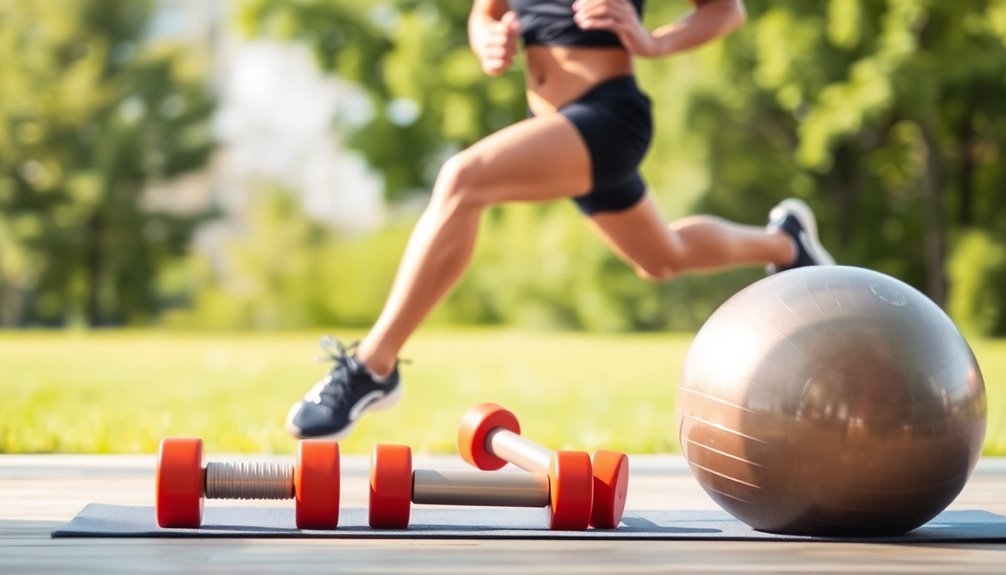Building core strength is essential for improving your running efficiency. Strong core muscles stabilize your body and maintain proper alignment, reducing the risk of injury while enhancing performance. Focus on exercises like planks, bicycle crunches, and single-leg glute bridges to target key muscles such as the rectus abdominis and glutes. Incorporating these workouts into your routine can help you resist fatigue and run longer distances. Keep going to discover more tips for optimizing your core strength.
Key Takeaways
- Strengthening core muscles enhances running posture, reducing strain on joints and improving overall efficiency.
- Incorporate exercises like planks and glute bridges to target key core areas vital for running.
- Aim for three 30-minute core training sessions weekly to boost speed and endurance during runs.
- Prioritize recovery through rest, foam rolling, and a balanced diet to support muscle growth and performance.
- Ensure adequate sleep to enhance recovery and optimize core strength training benefits for running.
Understanding Core Strength and Its Importance for Runners

When you run, your core strength plays an essential role in how efficiently you move. A strong core stabilizes the muscles in your stomach, hips, pelvis, and lower back, helping you maintain proper alignment.
This stability is vital for enhancing your running performance and reducing the risk of injuries to your knees, ankles, and lower back. With strong core muscles, you can resist fatigue better, allowing you to keep your posture aligned and improve your overall running efficiency.
To achieve this, you should incorporate targeted core exercises at least three times a week. Strengthening your core not only boosts your stability but also contributes to improved speed and endurance, making your runs more effective and enjoyable. Additionally, focusing on high vibrational energy can enhance your overall athletic performance and mindset.
Key Core Muscles Involved in Running

Strong core muscles are at the heart of effective running. Key core muscles help enhance your stability and guarantee efficient running. Here's a closer look at these essential muscles:
| Core Muscle | Function | Importance for Running |
|---|---|---|
| Rectus Abdominis | Flexes the spine, maintains posture | Supports overall alignment |
| Obliques | Aids in rotational movements | Enhances running mechanics |
| Transverse Abdominis | Provides stability to pelvis and lower back | Prevents injuries |
| Erector Spinae | Stabilizes the spine | Supports endurance |
| Glutes | vital for hip stabilization and power | Directly affects speed |
| Pelvic Floor | Enhances core stability | Maintains ideal alignment |
Incorporating core strengthening exercises can significantly improve running efficiency, as they contribute to preventing injuries that can hinder performance.
Benefits of Core Strength for Running Performance

Building core strength can greatly enhance your running endurance and help prevent injuries. A stable core supports proper posture and alignment, reducing strain on your joints as you log those miles. Additionally, a strong core contributes to overall wellness by improving your body's efficiency in various physical activities.
Injury Prevention Strategies
While many runners focus on leg strength and endurance, neglecting core stability can lead to injuries that sideline your progress. Enhanced core strength stabilizes your torso and hips, which minimizes the risk of common running injuries to the knee, ankle, hip, and lower back.
By reducing inward knee motion, a strong core alleviates strain on your knee joints, aiding in injury prevention. Incorporating specific exercises for runners can considerably improve your running performance by resisting fatigue during longer runs.
Research shows that core workouts can decrease ankle range-of-motion asymmetry by 46%, further reducing injury risk. Prioritizing core strength not only enhances your stability but also keeps you running consistently and efficiently. Additionally, maintaining proper installation practices can further support your overall performance by ensuring your body functions optimally.
Enhanced Running Endurance
A well-developed core not only helps prevent injuries, but it also plays a significant role in enhancing your running endurance. A strong core stabilizes your torso and hips, allowing you to maintain proper running form and resist fatigue during long runs. Improved core strength leads to better running economy, which means more efficient energy use and increased speed.
| Benefits of Core Strength | Impact on Running Performance |
|---|---|
| Stabilizes the body | Reduces risk of injuries |
| Maintains running form | Enhances endurance |
| Resists fatigue | Improves pace |
Incorporating core workouts into your routine can help you improve your running, enabling you to maintain your pace longer and run more efficiently without significant changes in heart rate. Additionally, effective communication about your training goals can further enhance your motivation and commitment to improving your running performance.
Effective Core Exercises for Runners

To enhance your running efficiency, incorporating effective core exercises into your routine is essential. Focus on exercises like planks, bicycle crunches, and single-leg glute bridges, which target your rectus abdominis, obliques, and glutes.
These core exercises improve stability, vital for maintaining posture during runs. Aim for at least three 30-minute sessions weekly, as research shows this can boost your running speed and endurance markedly. Additionally, strengthening your core can lead to improved performance in other physical activities, similar to how using the right oil can enhance the performance of airless sprayers.
Include dynamic variations like unstable planks or resistance bands to maximize muscle activation. Don't forget mountain climbers and cross crawls, as they mimic running patterns and enhance cardio fitness.
Incorporating Core Work Into Your Running Routine

Incorporating core work into your running routine not only boosts your performance but also helps prevent injuries.
By focusing on core exercises, you'll enhance muscle endurance and reduce fatigue during your runs.
Here are three effective ways to integrate core strength training:
- Schedule core workouts on non-hard run days to allow muscle recovery while still promoting overall fitness.
- Perform targeted bodyweight exercises like planks and bicycle crunches to stabilize key muscle groups, essential for maintaining proper running form.
- Aim for three 30-minute sessions weekly to greatly improve your running efficiency; research shows this can cut down your 5km run time by an average of 66 seconds.
Additionally, incorporating stress management techniques can further enhance your overall performance and recovery.
Make core work a priority, and watch your running performance soar!
Recovery and Nutrition Tips for Optimal Core Strength

While you're pushing your limits in core strength training, don't overlook the importance of recovery and nutrition.
Prioritize rest days in your schedule, as muscle growth and performance enhancement happen during these breaks. Incorporate foam rolling and stretching after workouts to aid muscle recovery and reduce soreness, which promotes better core strength.
Staying hydrated is vital; monitor your fluid intake to support muscle function and recovery, since dehydration can hinder performance. Fuel your body with a balanced diet rich in lean proteins, whole grains, and fruits and vegetables, providing the essential nutrients needed for muscle repair.
Finally, aim for 7-9 hours of quality sleep each night to enhance recovery and improve overall performance in your core strength training. Additionally, consider the benefits of proper hydration as it plays a crucial role in maintaining muscle health and performance.
Frequently Asked Questions
Can Having a Strong Core Help You Run Faster?
Yes, having a strong core can definitely help you run faster.
A strong core stabilizes your torso and hips, allowing for better running form. When your core is engaged, you maintain proper posture, reducing fatigue and the risk of injury.
This stability helps you generate more power with each stride, enhancing your overall efficiency.
How Do I Strengthen My Core for Running?
To strengthen your core for running, incorporate exercises like planks, bicycle crunches, and single-leg glute bridges into your routine at least three times a week.
Focus on both your abdominal and lower back muscles with moves like hollow holds and windscreen wipers.
Don't forget dynamic exercises like mountain climbers to mimic running patterns.
Aim for muscle fatigue rather than specific reps, and mix up your workouts to keep things fresh and effective.
Does a Weak Core Affect Running?
A weak core definitely affects your running. Imagine trying to sprint while your upper body sways and your hips wobble—it's not efficient, right?
When your core isn't strong, it can lead to poor posture and instability, making each step feel harder. You might notice fatigue setting in faster, and you could be at a higher risk for injuries.
Strengthening your core will help you maintain balance and improve your overall running performance.
How Does Core Strength Improve Performance?
Core strength improves your performance by enhancing stability and balance.
When your core's strong, you can maintain better posture, reducing fatigue during runs. It helps you transmit force more efficiently during both the launch and landing phases, allowing you to run faster and more effectively.
Plus, a strong core supports your joints, lowering the risk of injuries.
Conclusion
So, while you might think all that running will do the trick, ignoring your core strength is like trying to drive a car with a flat tire. You wouldn't expect it to perform well, right? By focusing on those core muscles, you'll not only boost your running efficiency but also enjoy every mile a bit more. Embrace the irony—you're not just a runner; you're a core athlete in disguise, ready to conquer the road ahead!









